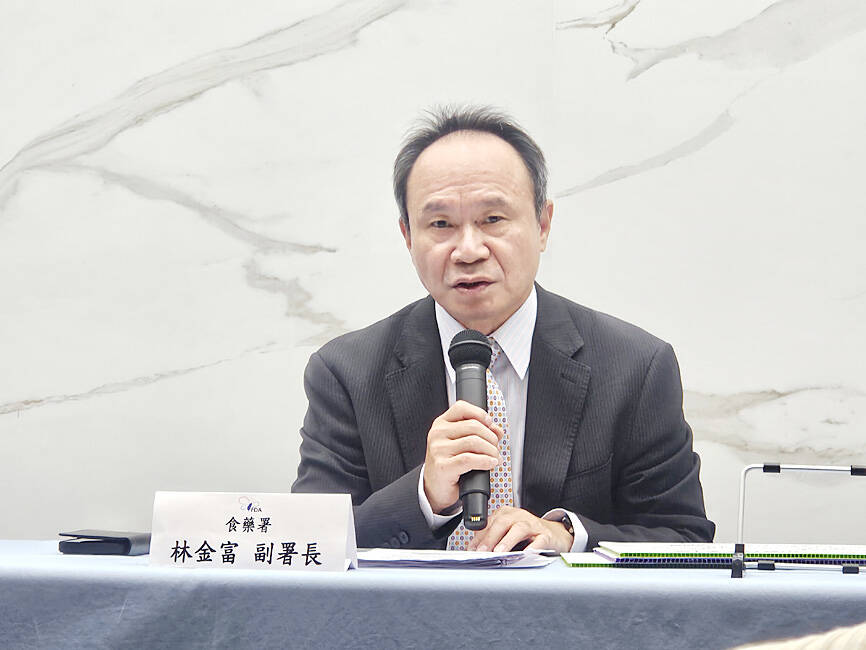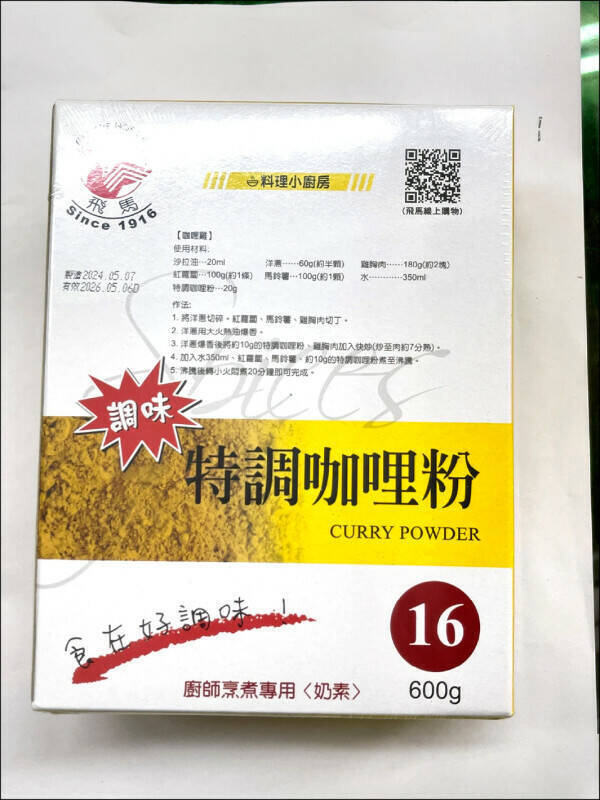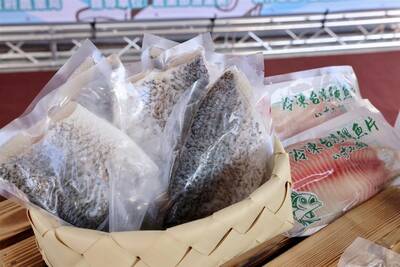A banned toxic Sudan red dye was detected in turmeric used in a curry powder sold by a Taiwanese company, the Food and Drug Administration (FDA) said yesterday, while the Ministry of Education informed schools nationwide to temporarily suspend the use of the powder.
The Flying Horse Special Mix Curry Powder produced by Taiwanese company Chiseng Hong Ltd initially tested positive for 7 parts per billion (ppb) of Sudan I on Oct. 25 during a routine inspection by the New Taipei City Department of Health, the FDA said.
Following the initial detection, the agency sought to identify the specific raw ingredient in the product contaminated with Sudan dye, a red synthetic dye that is banned in Taiwan for use in foodstuffs, including types such as Sudan I and Sudan III, FDA Deputy Director-General Lin Chin-fu (林金富) told a news conference in Taipei.

Photo: CNA
The FDA tested one box of the batch of 5,253 600g boxes of curry powder produced by Chiseng Hong, with an expiration date of May 6, 2026, Lin said.
“Nine samples of raw ingredients used to produce this batch of mixed curry powder were also collected for a total of 10 samples submitted to the FDA’s research and analysis unit for testing,” he said.
The unit detected Sudan I in the curry powder at a concentration of 8ppb, while a qualitative analysis of the sample of turmeric powder, one of the nine raw ingredients, also confirmed the presence of Sudan I, he added.

Photo courtesy of Department of Health, Kaohsiung City Government
FDA Northern Center Director Cheng Wei-chih (鄭維智) said that the tainted curry powder produced by the Taipei-based Chiseng Hong had been distributed across nine counties and cities, and 1,958 boxes — about 37 percent of the total — have already been recalled.
The Ministry of Education instructed schools across the country to suspend the use of the curry powder until Jan. 20 next year.
That notice follows orders from local education authorities in Taipei, New Taipei City, Keelung, Taichung and Taoyuan issuing similar bans, with other cities and counties following suit. Some of those bans extended to all chili and curry powders.
Cheng said the turmeric powder used in Chiseng Hong’s curry powder was imported from India.
Twenty-two businesses in Taiwan have imported turmeric powder from India since 2022, he said, adding that health authorities would immediately initiate a comprehensive inspection of those businesses and the turmeric powder they imported.
In response to the incident, border inspections on turmeric powder imported from India would be subject to batch-by-batch inspection for Sudan dyes for one year starting from Tuesday, he said.
“Any Sudan dye detected at the border will result in the product being destroyed, without the option for return shipment,” Cheng added.
The incident involving Chiseng Hong’s curry powder followed a similar incident earlier this year, in which Sudan III was found in chili powder imported from China.
That prompted the FDA to implement batch-by-batch inspections on imported spices and sauces, including chili powders, from all countries beginning in early March.
Lin said that the tainted batch of turmeric powder was imported from India before the enhanced border inspections were implemented early this year.
“Therefore, our current border control measures remain effective,” he said.
However, the FDA later said that prior to Tuesday, 35 types of imported spices and sauces had been subject to batch-by-batch border inspections to screen for banned dyes and pesticides, but turmeric powder was not included.
None of the 35 types of spices and sauces subject to batch-by- batch inspections since March — including cumin, black pepper and chili powder, all ingredients in the mixed curry powder — tested positive for Sudan dyes, the FDA said.

Taiwan's Vice President Hsiao Bi-khim (蕭美琴) said Saturday that she would not be intimidated by the Chinese Communist Party (CCP), following reports that Chinese agents planned to ram her car during a visit to the Czech Republic last year. "I had a great visit to Prague & thank the Czech authorities for their hospitality & ensuring my safety," Hsiao said on social media platform X. "The CCP's unlawful activities will NOT intimidate me from voicing Taiwan's interests in the international community," she wrote. Hsiao visited the Czech Republic on March 18 last year as vice president-elect and met with Czech Senate leadership, including

There have been clear signs of Chinese Communist Party (CCP) attempts to interfere in the nationwide recall vote on July 26 in support of Chinese Nationalist Party (KMT) legislators facing recall, an unnamed government official said, warning about possible further actions. The CCP is actively involved in Taiwanese politics, and interference in the recall vote is to be expected, with multiple Chinese state media and TAO attempts to discredit the Democratic Progressive Party (DPP) and undermine public support of their recall movement, the official said. This interference includes a smear campaign initiated this month by a pro-Beijing Hong Kong news outlet against

A week-long exhibition on modern Tibetan history and the Dalai Lama’s global advocacy opened yesterday in Taipei, featuring quotes and artworks highlighting human rights and China’s ongoing repression of Tibetans, Hong Kongers and Uighurs. The exhibition, the first organized by the Human Rights Network for Tibet and Taiwan (HRNTT), is titled “From the Snowy Ridges to the Ocean of Wisdom.” “It would be impossible for Tibetans inside Tibet to hold an exhibition like this — we can do it. because we live in a free and democratic country,” HRNTT secretary-general Tashi Tsering said. Tashi Tsering, a Taiwan-based Tibetan who has never

A first shipment of five tons of Taiwan tilapia was sent from Tainan to Singapore on Wednesday, following an order valued at NT$600,000 (US$20,500) placed with a company in the city. The products, including frozen whole fish and pre- cooked fish belly, were dispatched from Jiangjun Fishing Harbor, where a new aquatic processing and logistics center is under construction. At the launch, Tainan Mayor Huang Wei-che (黃偉哲) called the move a “breakthrough,” marking Taiwan’s expansion into the Singaporean tilapia market. Taiwan’s tilapia exports have traditionally focused on the United States, Canada, and the Middle East, Huang said, adding that the new foothold in